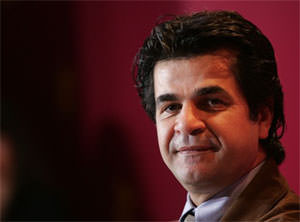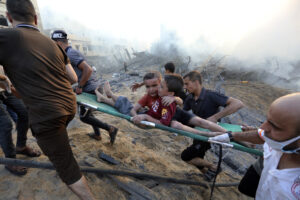The Oliver Stone of Iran
The veteran journalist and Mideast traveler profiles Jafar Panahi (above), whose socially conscious films have earned him critical acclaim, box-office success and the unwelcome scrutiny of his government.
Iranian director Jafar Panahi kept postponing our interview. He had been very friendly when we chatted at the informal party honoring Sean Penn during his 2005 visit to Tehran, so I couldn’t figure out his reluctance. Then I found out why.
Panahi was just finishing the semi-secret filming of his film “Offside” and worried that press coverage could alert the authorities. Once shooting was complete, he welcomed me into his north Tehran home and wanted to show me clips from the film.
“Offside” tells the story of Iranian women who dress up as men to surreptitiously attend soccer matches. Iranian society is soccer mad. During World Cup and other major matches, the country practically shuts down as people sit glued to TVs and radios. But Iranian women can’t attend soccer games because they would intermix with men.
The film was completed in 2006 and was an immediate hit at international film festivals. It opened in Los Angeles and New York April 6 and will be hitting other cities in the coming weeks. But it has yet to play inside Iran.
Bad boy lives the good life
Panahi lives in a very upscale condo with a commanding view of the nearby mountains. He’s the Oliver Stone of Iran — a bad-boy director living the good life.
Panahi is known for directing intense human dramas that reflect the difficulties of ordinary Iranians. “I’m a social filmmaker, not a political filmmaker,” he told me. “A social filmmaker learns from his surroundings.” Panahi has faced serious government hassles with all of his recent films, and he noted that government officials “don’t like to be criticized in any way.”
Panahi doesn’t flash overt political messages in his films, but he portrays people facing poverty and despair who are forced into compromising situations. His 2004 film “Crimson Gold” depicts an Iran-Iraq war veteran’s slow descent into violent madness. The 2000 feature “The Circle” portrays overlapping stories of women ex-convicts trying to survive on the fringes of Iranian society. For a male director, Panahi shows an unusually deep understanding of women characters.
Because of the controversial nature of his films, the Iranian government won’t grant official permission for him to make new ones. The government funds all films in Iran, and exercises strict censorship over their content.
Shooting “Offside” undercover
When preparing to shoot “Offside,” Panahi decided to go through the process anyway. When he applied for the screenplay permit, he was told that he couldn’t make the film until he agreed to the cuts censors had mandated in his past films, such as cutting out the last 20 minutes of “The Circle.” (“The Circle” never officially played in Iran, but it was very successful in foreign distribution.) Panahi said he refused to make the cuts and had someone else apply for the permit to shoot “Offside.”
Then life began to imitate art. His leading lady, dressed as a man, walked up to Tehran’s soccer stadium and tried to get in. Panahi and the camera crew were hiding in a car down the street. “The police arrested the actress,” Panahi told me, “and beat her up. We went to rescue her, and they found the cameras. The cinematographer hid his main camera, but they saw the backup camera.”
The actress and some of the crew were arrested. Panahi confronted the police and threatened to publicize the arrests. So they were freed. But the young, nonprofessional actress was extremely upset and crying. Panahi asked her why. “Didn’t you see what they did to me?” she asked.
He told me: “This is the story of our movie. Our movie is based on reality.” And he added, “And we had all of that on tape.”
Panahi was shooting with a digital camera, which both kept costs down and gave him flexibility for hand-held street work. Once he got the film in the can, or more precisely duplicated on the hard drive, editing on a home computer was easy. Such technological advances make it far easier now for Iranian directors to shoot and later distribute their films internationally.
Life imitates art
In May 2006 life imitated art once again. President Mahmoud Ahmadinejad, in a populist declaration, announced that women would be able to attend soccer matches if they sat in segregated sections. Soccer fans, particularly women, were temporarily overjoyed. It turns out there’s no Iranian law prohibiting women, only unofficial regulations. Within a week of the announcement, however, Iran’s Supreme Leader Ali Khamenei reversed the order and kept women out. Ahmadinejad said nothing more about the issue.
Panahi continued to walk a fine line. He told me that government officials had told him to leave the country but he refused. He told the officials, “If I don’t make any movies, both the national and international press will talk about it.” The officials relented. “I use this popularity as a credit card,” he said.
Ironically, his international popularity did him no good when dealing with U.S. authorities. On April 15, 2001, Panahi was flying to Argentina from Hong Kong to attend a film festival. He had to change planes in the United States, where immigration officials demanded to take his fingerprints.
The U.S. government had a policy that all Iranians entering the country, even those in transit, had to be fingerprinted — a policy not applied to other visitors at the time. Panahi refused on principle to be fingerprinted.
So immigration officials detained him. “They chained my hands to my waist. I stayed there for 18 hours. It reminded me of the Dark Ages. Since I refused to be fingerprinted, I was sent back to Hong Kong, and I couldn’t fly to Argentina.”
The incident received widespread coverage in Iran and the U.S. Panahi has not returned to the United States since.
So like many other Iranians fighting for a more open society, Jafar Panahi remains critical both of his own government and of the Bush administration.
Reese Erlich’s book “The Iran Agenda: The Real Story of U.S. Policy and the Middle East Crisis” will be published by PoliPointPress in October.
Your support matters…Independent journalism is under threat and overshadowed by heavily funded mainstream media.
You can help level the playing field. Become a member.
Your tax-deductible contribution keeps us digging beneath the headlines to give you thought-provoking, investigative reporting and analysis that unearths what's really happening- without compromise.
Give today to support our courageous, independent journalists.






You need to be a supporter to comment.
There are currently no responses to this article.
Be the first to respond.